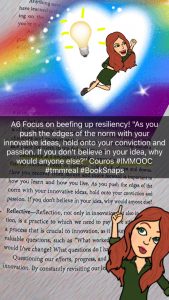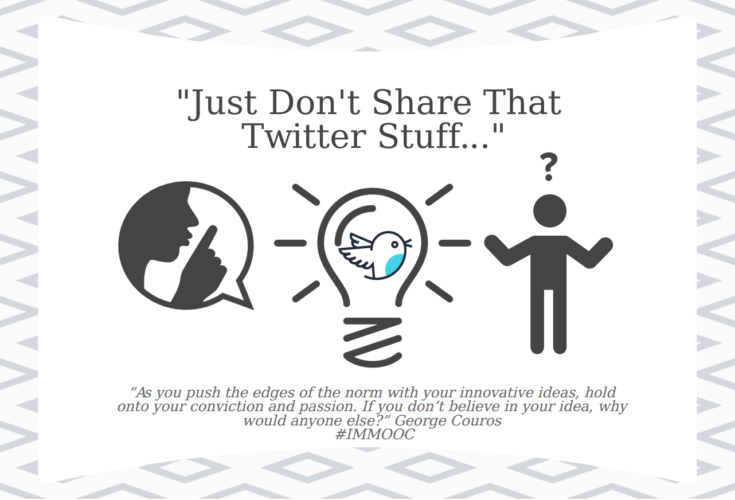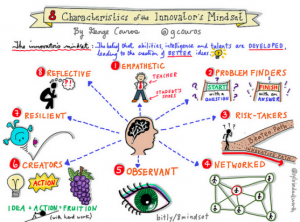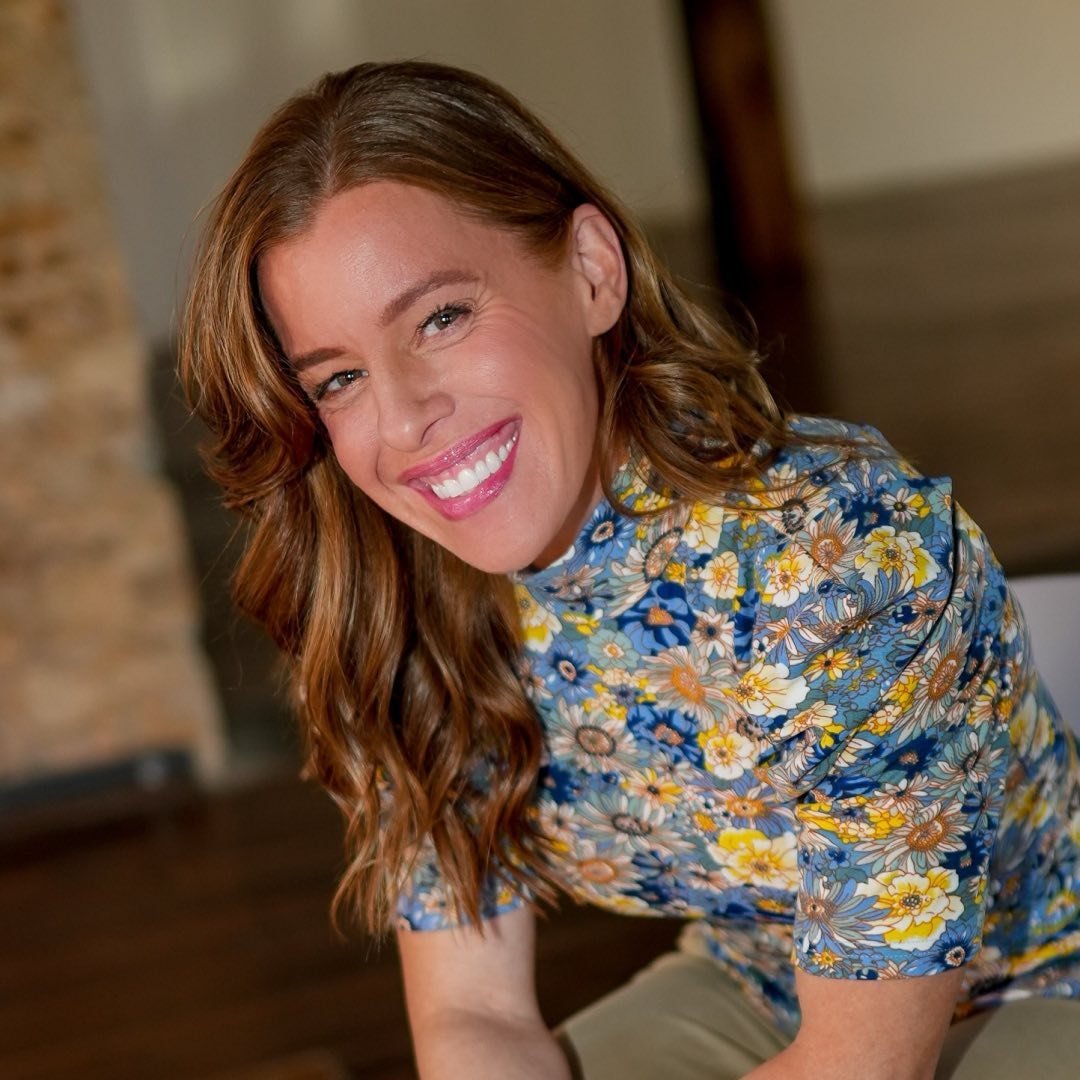Recently I consulted several mentors of mine to gain advice about preparing for administration interviews. Cumulatively, they voiced a myriad of tips and wisdom for me to take along on this journey. A couple of suggestions were, “Tara, just be YOU and show them what you do!” “Make sure to know their system statistically.” “Share all of the wonderful ways you lead, coach and mentor teachers.” As one after another offered their knowledge from experience, one stood out to me. “Tara, just don’t share that Twitter stuff you do. You don’t need to talk about that. Tell of REAL experiences with REAL leaders in education. You know what I mean? I know you love that Twitter stuff, but it isn’t necessary to share in this type of setting.”
Granted, I highly respect the educators I sought out for counsel; they know what’s best, right? After hearing these suggestions, my blood did NOT boil, nor did I immediately defend myself. Instead, I tried to understand better. What experiences have they had with connected educators?
Why might this individual 1) discredit the professionals on Twitter or 2) expect me to be anything less than the REAL me?
I think they meant well by sharing this information. However, it seemed as though they wanted me to answer the questions to please my audience. Which left me with a couple of burning questions, “Do I want an administration job that bad? Would I want to lead a system knowing I’d need to omit a chunk of who I really am?”
As I got in my car that day, my head was spinning. While I’ve only been on Twitter for about eight months, there is NO way I can deny my professional growth from collaborating with my professional learning network. No doubt that isn’t the “whole pie” for Tara Martin, but it’s every bit a part of the REAL me.
*Side note: I had a Twitter account for a while, but literally had to hack into it eight months ago, because I had forgotten the username and password. If I remember correctly, I had about three tweets and could count my followers on one hand. It wasn’t until the summer of 2016 that I became a connected educator and REALLY understood what this “Twitter stuff” was all about.
I began to reflect on the new and better things that I’ve developed from becoming a connected educator. What characteristics of an Innovator’s Mindset have I developed over the last eight months?
• Met George Couros who taught be about possessing a Digital Footprint and joining Twitter for EDU. At this point, I began to grow a connected network of educators.
• George influenced me to take a risk and create my professional digital portfolio to reflect and share my experiences.
• Read The Innovator’s Mindset, my first “Twitter influenced” educational book.
• Met Dave Burgess who encouraged me to build a Professional Learning Network (PLN).
• Experienced “professional development on steroids” via weekly Twitter chats and empathetically began to understand others’ points of view, globally.
• Joined #IMMOOC 1 to network with educators around the world.
• Encouraged and empowered others by hosting Twitter chats, a risk-taking experience for me.
• Connected with many of my PLN members face-to-face at conferences.
• Took a risk and began speaking at conferences outside my district. I LOVE it!
• Networked with educators across the nation by hosting Voxer book studies.
• Found a Problem- “Put cell phones away! No Snapchat!” So, I created a solution to the problem called #BookSnaps , a way to use Snapchat for EDU-Awesomeness.
…and this list can go on for a long while.
How was I supposed to leave that CHUNK of my professional growth out of an interview conversation?
What does a girl do in a situation like this?
Easy. Be REAL!
The Interview Process
During the interview, I shared my enthusiasm for education, my hands-on experiences in leadership as well as the “connected educator” influences. In fact, a slide of the Innovator’s Mindset landed in my “Top 3” characteristics that describe ME. Why wouldn’t I? I gave examples of how possessing an Innovator’s Mindset has enhanced my performance as an educator and empowered those within my influence. The conversation led to sharing a little bit about #BookSnaps and stories of how students around the world are connecting to text–21st Century style. Needless to say, the innovator’s mindset was interwoven throughout that entire conversation.
 At the conclusion of the interview, I opened my heart with a few statements, “Do we want to be good? Or, do we want to be great? I believe if we want to be great we must tap into students’ passions, their strengths. We must help them develop an innovator’s mindset. Why? The future ahead of us is full of uncertainties, but there is one thing of which I feel sure. Smart machines will quickly take the place of “making the grade” and “meeting the standards.” However, I firmly believe robotic devices will NOT be able to replicate the individual passions of every student, every educator, and every human. I can’t imagine that ever being the case. So, how might we prepare students for the future? But more than that, how might we prepare them for right now? We must help them develop an innovator’s mindset, and I’m eager to actively take action to add passion-led learning back into our school system. I realize we need balance, but I want students to not only learn but LOVE learning.”
At the conclusion of the interview, I opened my heart with a few statements, “Do we want to be good? Or, do we want to be great? I believe if we want to be great we must tap into students’ passions, their strengths. We must help them develop an innovator’s mindset. Why? The future ahead of us is full of uncertainties, but there is one thing of which I feel sure. Smart machines will quickly take the place of “making the grade” and “meeting the standards.” However, I firmly believe robotic devices will NOT be able to replicate the individual passions of every student, every educator, and every human. I can’t imagine that ever being the case. So, how might we prepare students for the future? But more than that, how might we prepare them for right now? We must help them develop an innovator’s mindset, and I’m eager to actively take action to add passion-led learning back into our school system. I realize we need balance, but I want students to not only learn but LOVE learning.”
Let’s just say…”that Twitter stuff” certainly had its place during this process. After two rounds of interviews and the only candidate with no administrative experience, they offered me the job. Why? “Your passion for education is contagious! We want more of it!” To me, this meant, “We want the REAL you! YOU are the missing puzzle piece to our team.”
George said it best in Part 1 of The Innovator’s Mindset, “As you push the edges of the norm with your innovative ideas, hold onto your conviction and passion. If you don’t believe in your idea, why would anyone else?”



